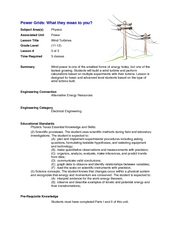Curated OER
Force/Newton's Laws/Friction
Students describe how to recognize a force, define balanced and net forces, state Newton's first law of motion, explain why friction works, state Newton's second Law of Motion, and explain why the direction of force is important.
Curated OER
The Ghost Particle
Students collect evidence to make inferences about a object hidden inside a sealed box. They think critically and logically to raise questions. Students identify questions that can be answered through investigation. They formulate and...
Curated OER
Olympics
In this Olympics worksheet, students answer multiple choice regarding training at and for the Olympics. Students complete 5 questions.
Curated OER
"Water, Water Everywhere and None to Drink"
Ninth graders research the importance of maintaining an unpolluted water source in their community. They work together in groups and brainstorm ideas on what they can do to help. They can also write their local politicians.
Curated OER
Investigation of Hooke's Law Lab
Learners determine the spring constant by conducting an investigation. In this physics lesson plan, students collect data and create a graph of force vs. displacement. They compare the results of two different methods to find spring...
Curated OER
Lesson- Infinite Potential Well
Student create a numerical model which integrates Schrodinger's equation in 1 dimension. They discuss the properties of the solutions which match the boundary conditions. Student discusss any limitations if there are any in there model.
Curated OER
Angles: Angles, Angles, Everywhere
Students estimate and accurately measure the size of angles communicate with the appropriate geometric terms and symbols to describe and name angles, lines, line segments, rays
Curated OER
Newton's 3rd Law
Learners examine how the formal definition of Newton's 3rd law: forces always originate in pairs, equal in magnitude and opposite in direction. They also examine how the informal, qualitative version: Each action has an equal and...
Curated OER
Swinging on a String
Students explore how pendulums work and why they are useful in everyday applications. In a hands-on activity, they experiment with string length, pendulum weight and angle of release.
Curated OER
Wind Turbines
Students build their own wind turbine. In this physics instructional activity, students calculate the power output of their wind turbines. They evaluate their design and make the necessary modifications.
Physics Classroom
The Physics Classroom: Momentum Conservation Principle
A tutorial that explains the law of conservation of momentum using examples, an animation, a video, and interactives. Includes questions for self-checking one's understanding.
Physics Aviary
Physics Aviary: Practice Problems: Energy and Momentum Conservation Level 1
Students will be told the total energy added to the two carts by the spring and then they must use this along with momentum conservation to find the speed of each car as they move away from each other.
Physics Aviary
Physics Aviary: Practice Problems: Momentum Conservation Level 1
Students must determine the unknown mass in a problem involving momentum conservation. Both objects begin at rest and are propelled apart by a tap activated spring.
Physics Aviary
Physics Aviary: Practice Problems: Momentum Conservation Level 2
Students must determine the unknown mass in a problem involving momentum conservation. One object begins at rest and the two objects stick together during the collision.
Physics Aviary
Physics Aviary: Practice Problems: Momentum Conservation Level 3
Students must predict the speed in a problem involving momentum conservation. One object overtakes the other and the two objects stick together during the collision.
Physics Aviary
Physics Aviary: Practice Problems: Momentum Conservation Level 4
Students must predict the speed in a problem involving momentum conservation. The two objects have a head-on collision and stick together during the collision.
Physics Aviary
Physics Aviary: Practice Problems: 2 D Momentum Conservation With Energy
Students must predict the KE added to the system when a Kuiper Belt Object is hit with an explosive charge. Students must first look at the momentum of each piece after the explosion to determine the original speed of the Kuiper Belt...
Physics Aviary
Physics Aviary: Practice Problems: 2 D Momentum Conservation
Students must predict the original speed of a Kuiper Belt Object by hitting it with an explosive charge and looking at the momentum of each piece after the explosion.
Physics Classroom
The Physics Classroom: Momentum and Its Conservation Table of Contents
Students examine the impulse-momentum change theorem, the law of momentum conservation, and real world applications. The tutorial consists of lessons and problems to check for understanding.
Texas Education Agency
Texas Gateway: Angular Momentum and Its Conservation
By the end of this section, you will be able to understand the analogy between angular momentum and linear momentum, observe the relationship between torque and angular momentum, and apply the law of conservation of angular momentum.
Physics Classroom
The Physics Classroom: Momentum and Its Conservation: Isolated Systems
Students learn that total system momentum is conserved for collisions occurring in isolated systems. They will find out what makes a system of objects an isolated system, and whether momentum conserved if the system is not isolated.
Physics Classroom
The Physics Classroom: Momentum and Its Conservation: Algebraic Problem Solving
In this physics tutorial, the law of momentum conservation will be combined with the use of a momentum table and some algebra skills to solve problems involving collisions occurring in isolated systems.
Physics Aviary
Physics Aviary: Practice Problems: Spring Constant From Momentum Conservation
Students will need to determine the spring constant of a spring that gave two dynamics cars their momenta.
Physics Classroom
The Physics Classroom: Momentum and Its Conservation: Equations and Thinking
In this interactive physics tutorial, students will take a more qualitative approach to some collision problems. The questions provide a real test of conceptual understanding of momentum conservation in collisions.













